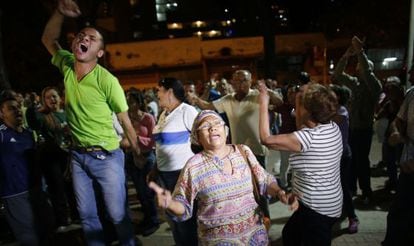Venezuelan voters turn their backs on ‘Chavismo’ after 17 years
Parties in opposition to President Maduro achieve landslide victory in legislative races


Voters in Venezuela on Sunday handed opposition parties a historic landslide victory over President Nicolás Maduro’s Socialists in hotly contested National Assembly legislative elections that ended 17 years of parliamentary rule by backers of the regime of the late president Hugo Chávez.
The Democratic Unity Roundtable (MUD) coalition took 99 seats compared to the 46 won by Maduro’s United Socialist Party of Venezuela (PSUV), Tibisay Lucena, president of the National Electoral Council (CNE), announced late Sunday.
Maduro blamed the defeat on the “economic war” waged by political interests inside his country and abroad
Votes to decide the remaining 22 seats, which will determine exactly how much legislative power each side will have, were still being counted and will not be known until later Monday.
Maduro accepted the “adverse results” and blamed the defeat on the “economic war” waged by political interests both inside his country and abroad. Venezuela is struggling with severe food shortages and crippling inflation as well as soaring crime.
A defiant Maduro said that “a counter-revolution” was taking place in Venezuela following the MUD’s landslide win and promised to carry on the revolution that had been initiated by his predecessor Chávez, who died in March 2013.
Venezuelans came out in droves on Sunday to vote in these decisive elections. Voter participation was listed at 74.25 percent.
Opposition leaders, such as Lilian Tintori, whose husband Leopoldo López has been held at a military jail since February 2014, had made a series of speeches encouraging people to vote for change.
One of the first measures the opposition has said it will draw up is a resolution calling for the release of all political prisoners in the country.
The new deputies in the 167-member assembly will be sworn in next month.
Although voting intention polls had pointed to a close race between the opposition and the PSUV, the results show a large gap between the presidency, which retains control of the powers of the state, and lawmakers whose majority will be represented by the string of parties that make up the MUD coalition.
Even though the CNE was late in releasing the first official results, it did not stop major opposition leaders such as Tintori from already celebrating what they called an “irreversible victory.”
Tintori’s husband López was sentenced to more than 13 years in prison earlier this year for rebellion and fomenting violence during a nationwide protest in February 2014.
Sunday’s victory for MUD was also viewed as a strong display of unity by the opposition parties, which had remained divided for much of the past 17 years, hampering their efforts to win any major election since Chávez came to power.
The opposition protested when it was announced that the ballot boxes would stay open an hour later
The MUD coalition is made up of a large group of parties from both sides of the political spectrum, which together share the common goals of steering the country’s course away from Chavismo, repairing diplomatic relations with the United States, and opening Venezuela to foreign investment.
Although no major incidents were reported at polling stations on Sunday, the opposition did protest when the CNE chief announced that ballot boxes would stay open an hour later than previously scheduled.
Maduro took the opportunity to call for “a people’s offensive” so that his supporters would converge at the ballot boxes during the final hour.
Under Venezuelan law, polling stations can remain open for an additional hour if there are people still standing in line. But Maduro actively tried to mobilize his supporters to go to the ballot boxes at the last minute.
Similar situations have occurred in the past. During Chávez’s last presidential election three years ago, the late president garnered an estimated 800,000 votes at the end of the day, which gave him a decisive victory over Miranda state governor and opposition candidate Henrique Capriles.
The same happened again after Chávez’s death in 2013 when Maduro narrowly won the presidential race over his opponent, Capriles, who was running for a second time.
English version by Martin Delfín.










































